Jesus Cleanses the Temple: A Profound Act Of Righteousness and Divine Authority

Jesus Cleanses the Temple: A Profound Act Of Righteousness and Divine Authority
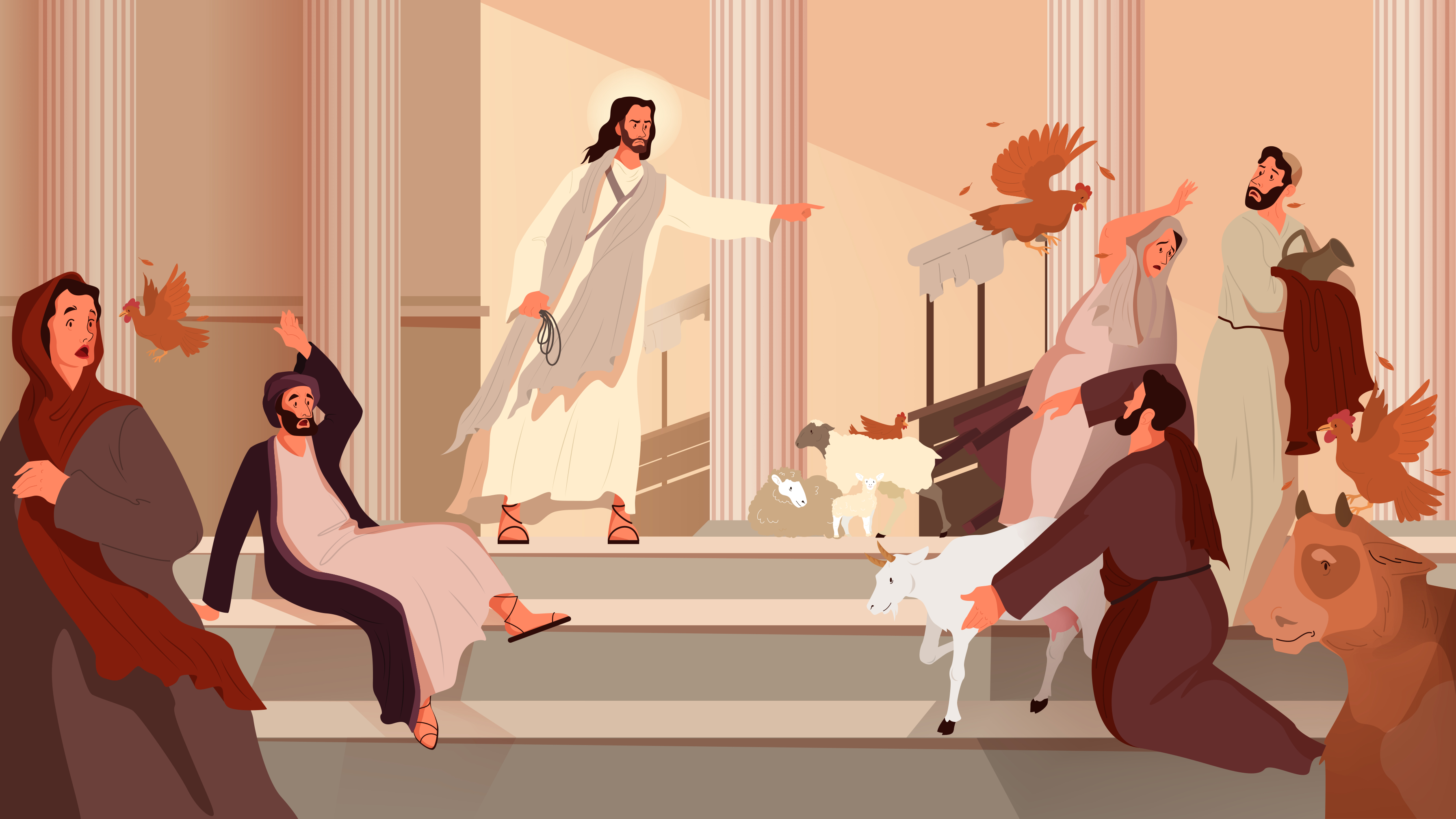
Jesus' cleansing of the temple is a powerful and significant event in the biblical narrative that showcases His divine authority and unwavering commitment to righteousness. Jesus in the temple, as the bible story goes, He overturned tables of those who were selling doves, selling animals for animal sacrifices, and chasing out animals. This was an act of righteousness and divine authority, as Jesus entered and demonstrated His anger at the desecration of a house of worship that should have been a place for prayer and devotion to God. This event showed that Jesus had the authority to feel taken back by the changers' money and criticize religious leaders and their corrupt practices.
In this captivating story, Jesus confronts greed and corruption within the religious sphere by driving out merchants who had turned a sacred space into a marketplace. As we delve deeper into this profound act, let's explore how it reflects Jesus' devotion to upholding holiness and purity while challenging Christians to emulate His example of courageous righteousness in our lives.
Key Takeaways
-
Jesus' cleansing of the temple demonstrated his divine authority and passion for upholding holiness and purity.
-
By driving out the merchants and challenging religious corruption, he reset the sanctity of God's house and showed his followers how to stand up against injustice and wrongdoing.
-
Christians are called to emulate Christ's example of righteousness and courage by maintaining holiness in all aspects of life, avoiding sinful behavior, guarding their minds against negative influences, and standing up for what is right.
Jesus Cleanses the Temple: A Profound Act Of Righteousness And Divine Authority
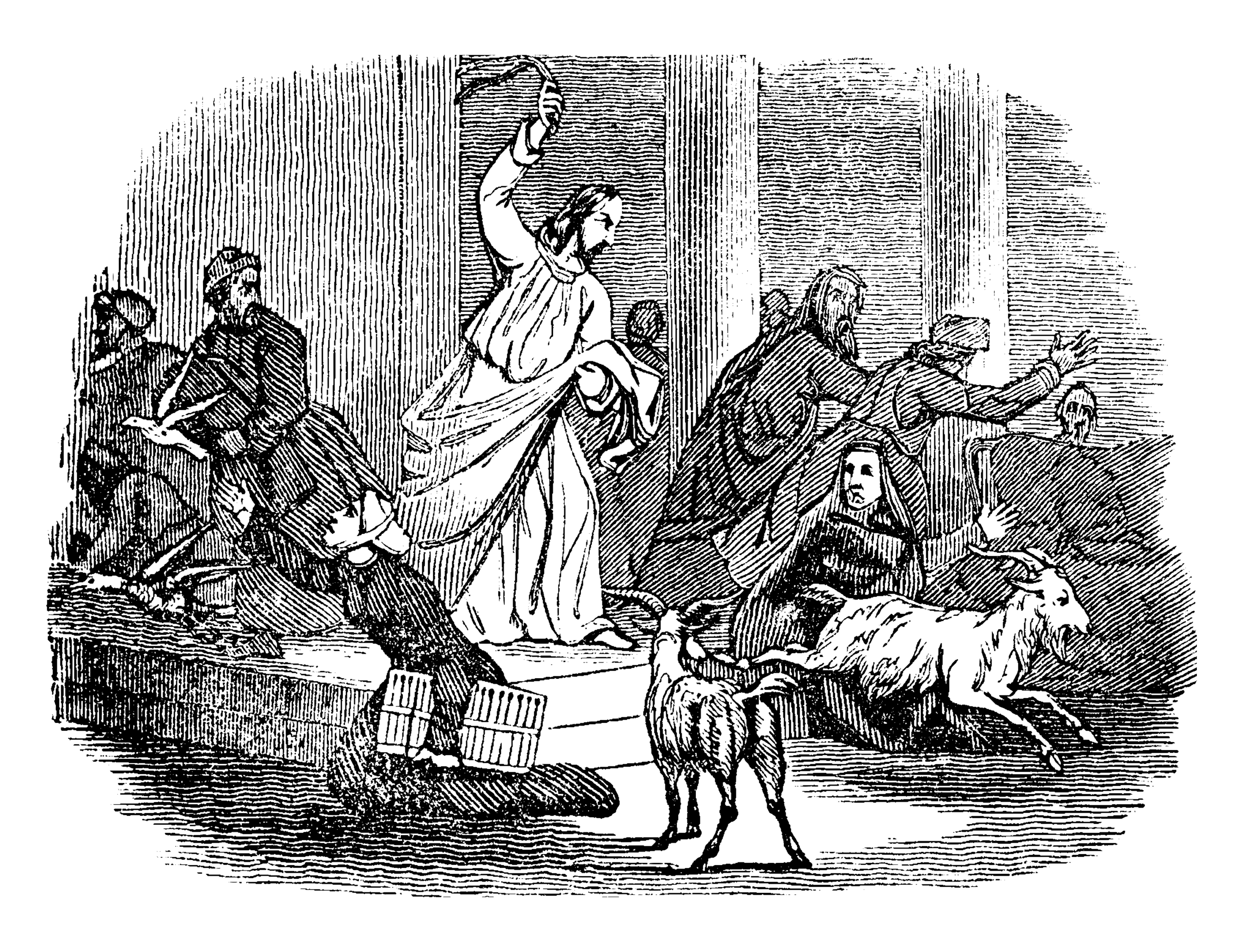
With righteous indignation and passionate action, Jesus drove out the merchants from the temple courts, challenging religious corruption and greed while demonstrating his divine authority.
Righteous Indignation and Passionate Action
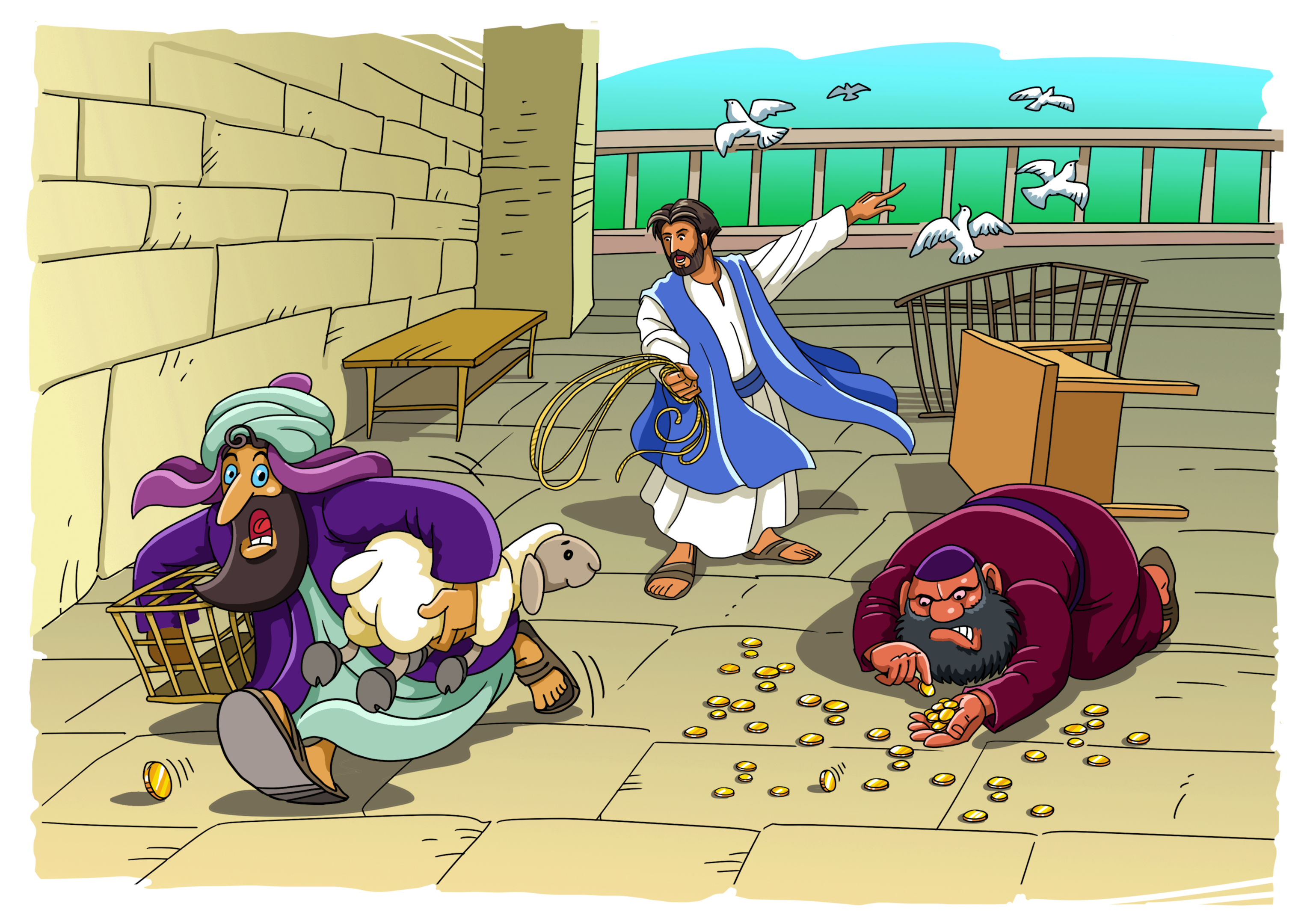
In His righteous indignation, Jesus displayed a profound sense of justice and passionate action as He took a stand against the corruption in the temple. Upon witnessing the money changers and merchants exploiting people who came to worship God, Jesus' fervent love for His Father's house fueled His decision to cleanse the temple.
Armed with zeal and authority, He overturned the tables of the money, chased out those conducting dishonest trade practices, and boldly declared that they had turned God's house into "a den of thieves" (Matthew 21:13).
An often-cited example of this display of righteous anger is in John 2:15 – when Jesus fashioned a whip made from cords to drive out both animals and those responsible for their sale.
Driving Out the Merchants'
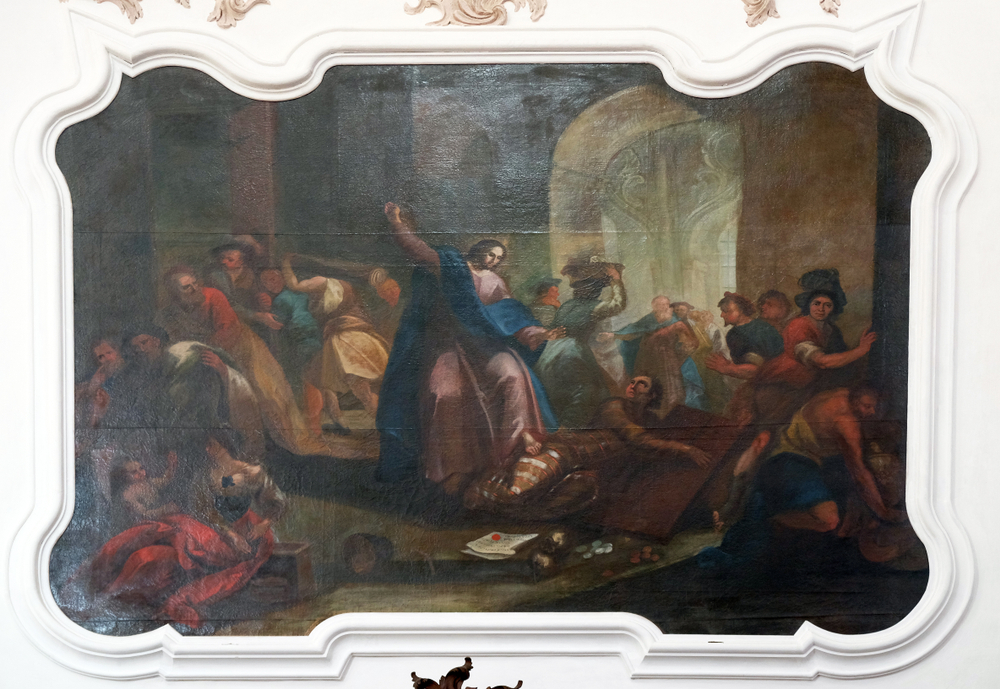
In a bold display of righteous indignation, Jesus confronted the merchants conducting business within the sacred temple courts. With unwavering conviction, He overturned their tables and drove them out along with those selling sacrificial animals such as doves and lambs.
These merchants had transformed the holy space into a marketplace, exploiting worshippers by charging exorbitant prices for their offerings to God.
Jesus' actions in driving out the merchants demonstrated His deep passion for maintaining purity and reverence within His Father's house. By challenging these unethical practices head-on, Jesus revealed His divine authority over religious matters while urging others to honor God with sincerity and humility. As described in Matthew 21:12-13, Jesus powerfully declared, "My house shall be called a house of prayer, but you are making it a den of robbers."
Challenging Religious Corruption and Greed
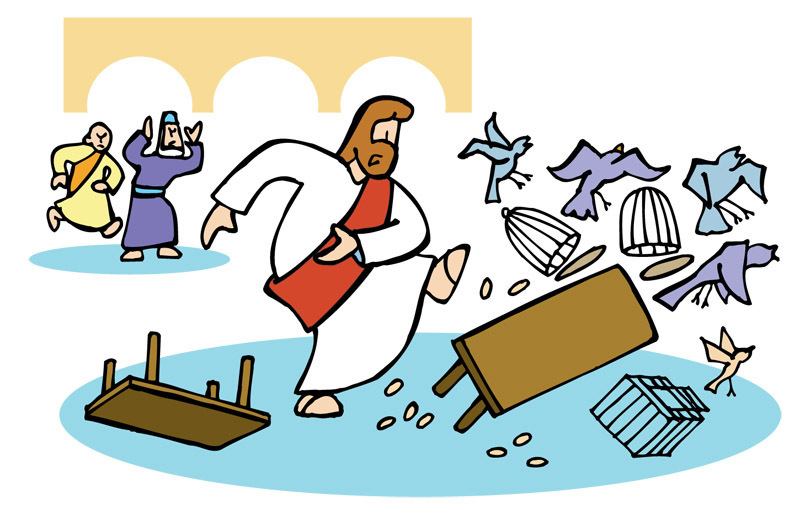
In challenging religious corruption and greed, Jesus boldly confronted the unscrupulous practices within the temple courts. The merchants and money changers sought to profit from worshippers who were required to make offerings or purchase sacrificial animals to observe Jewish law.
Jesus exhibited divine authority and righteous anger in the temple as he cleansed it, driving out the money changers who had defiled the sacred space. This powerful act is a testament to Jesus' commitment to denouncing unethical behavior in religious institutions. His actions drew attention to the rampant exploitation occurring in God's house and emphasized His unwavering dedication to preserving holiness and integrity in places of worship.
The Significance of Jesus' Actions
The Synoptic Gospels depict Jesus' actions in the temple. By cleansing the temple, Jesus restored the sanctity of God's house and showcased his divine authority and power over corruption and greed. He confronted ungodly men carrying merchandise and money changers in the outer court, emphasizing his righteous anger and the need for a second cleansing.
Restoring The Sanctity Of The Temple
The temple was intended to be a sacred space where people came to worship and offer sacrifices to God. By cleansing the temple, Jesus was not just driving out greedy merchants and money changers. He was also restoring the sanctity of God's house.
Jesus saw that this desecration needed to stop, and he took action. By driving out the merchants and overturning their tables, he showed that the house of God should never be treated as a profitable business venture.
In doing so, he reminded us of the importance of upholding holiness and purity in our children, lives, and places of worship.
When Jesus cleansed the temple, his righteous anger was met with a response as he taught similar principles to the disciples, who later remembered the incident. Jesus' actions also involved Roman soldiers, and he confronted those selling doves, emphasizing the value of a Jewish coin, half a shekel.
Demonstrating His Divine Authority
Jesus' cleansing of the temple was not just a display of righteous anger. They also served as a powerful demonstration of His divine authority over all things, including religious institutions.
By driving out the merchants, chief priests, and money changers who had set up shop in the temple courts, Jesus asserted His sovereignty and re-established God's rightful place as the center of worship.
Jesus' cleansing of the temple showed that He was not just another teacher or prophet but truly God in human form. It was an act that left an indelible impression on those who witnessed it and serves as a reminder to Christians today that we must prioritize God's presence and honor Him above all else.
Lessons And Applications for Christians Today
As believers, we must uphold holiness and purity in all aspects of our lives and environments, just as Jesus did when He cleansed the temple. Let's emulate Christ's example of righteousness, sacrifice, and courage in standing up against corruption and greed for the honor of God.
Upholding Holiness and Purity
Christians are called to uphold holiness and purity as Jesus did when He cleansed the temple. This means we must strive to live a life that is pleasing to God, free from sin and corruption.
One practical way to uphold holiness and purity is by guarding what enters our minds through media consumption. We should be mindful of the music, movies, TV shows, or social media content we consume because they influence our thoughts and actions.
Additionally, we can practice self-discipline by avoiding sinful behavior such as gossiping or engaging in sexual immorality.
Emulating Christ's Example of Righteousness And Courage
It can be challenging today to uphold holiness and purity, just like Jesus did when he cleansed the temple. However, as Christians, we are called to emulate His example of righteousness and courage.
Just like Jesus challenged religious leaders against corruption and greed, we should also stand against injustice or wrongdoing.
We should also follow Christ's example by being passionate about doing what is right, even if it may not be popular. We are called to love others, but not at the expense of compromising God's standards.
In summary, emulating Christ's example of righteousness and courage means standing up for what is right regardless of the consequences.
In the Bible, there are two passages that recount the events in Jerusalem during the Passover. These passages shed light on the significance of sacrifice and the sanctity of the temple. During this time, many people traveled to Jerusalem to offer sacrifices and commemorate this important religious observance.
As Jesus, the Son of God and the embodiment of divine wisdom, entered the temple, he began driving out those who were buying and selling within the outermost court. With authority and righteous indignation, he overturned the tables of the money changers and the seats of those selling doves. Jesus declared that the temple should be a house of prayer, a holy sanctuary dedicated to the worship of God, rather than a place of profit and exploitation.
In both the Gospel of Matthew and the Gospel of John, we find accounts of Jesus cleansing the temple. The Jews, including the religious leaders, challenged Jesus' actions and demanded a sign to prove his authority. In response, Jesus referred to himself as the Lord and made a prophetic statement, saying, "Destroy this temple, and in three days I will raise it up." Little did they understand that Jesus was not referring to the physical temple but to his own body, foreshadowing his sacrificial death and resurrection, which would bring eternal life to all who believe in him.
Furthermore, during this tumultuous event, the children in the temple courts were filled with awe and praise for Jesus. They recognized his wisdom and authority, echoing the words of the Psalmist, "Out of the mouth of babes and infants, you have established strength." In these passages, we witness a profound encounter in the temple, where Jesus reveals himself as the Christ, challenges the corrupt practices, and affirms the true purpose of the house of prayer, calling people to genuine worship and a deeper connection with God.
Conclusion
In summary, Jesus' cleansing of the temple was a powerful act of righteousness and divine authority that demonstrated his passion for upholding holiness and purity. By driving out the merchants and challenging religious corruption, he restored the sanctity of God's house and showed his followers how to emulate his example of righteous indignation and courage.
As Christians today, we can learn important lessons from Jesus' actions and strive to uphold all these things and same principles in our own lives.
Dr. Noemi Oliver
Follow us on Social Media
@BishopGOliver @Dr.NoemiOliver
